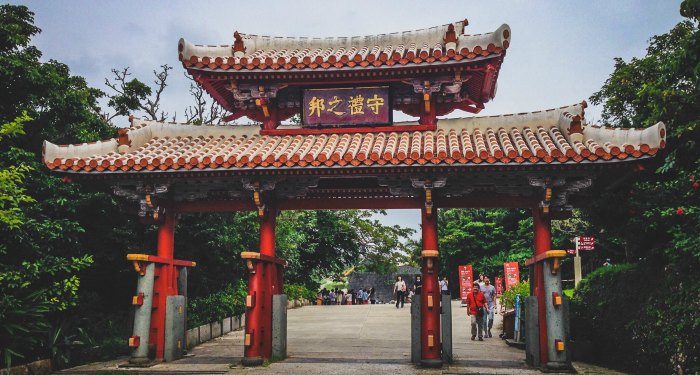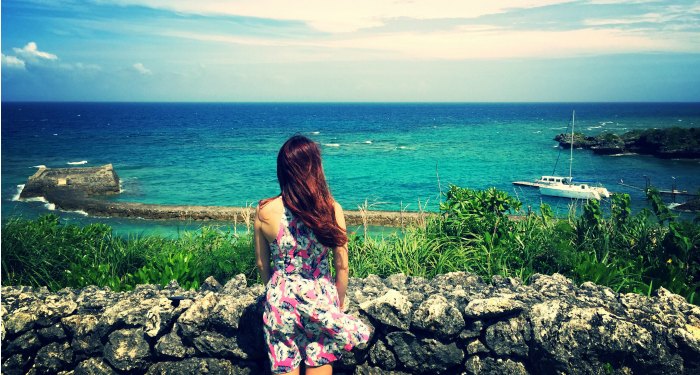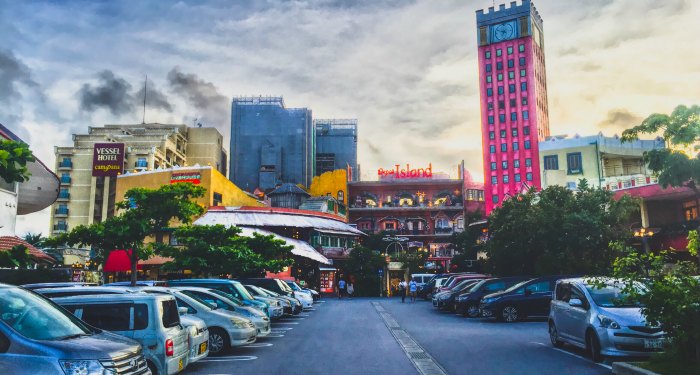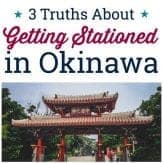Inside: Getting stationed in Okinawa? These are three things that transformed our time there for the better. Plus, a life lesson that came full circle at the end of our three years in Japan.
I never expected leaving the US for Okinawa to feel as hard as it did. We did volunteer to go after all, and if I’m being honest, we wanted the adventure of living overseas. But that’s not exactly how the journey went.
I’ll never forget the day I said goodbye to my dad before flying away to Oki for three years. I put my hand on the doorknob and prepared to walk out of his house when the emotional tidal wave slammed straight into my heart. I didn’t realize it until that moment, but that was the last time I would see my dad before we left.

Everything turned to slow motion as I released the knob, turned around and sprinted up the stairs to his office. Panic set in, and there was no stopping the tears from pouring down my cheeks and onto the floor. I looked to my dad, sobbing. “I’m…I’m…I’m leaving.” That was all I could manage to say in that moment, and between a father and daughter, those were the only words needed. He stood up, walked over to me and hugged me like I was a kid again.
Together we stood there sobbing. There’s a different feeling that comes with moving overseas, and in many ways, it feels like you’re leaving everything you’ve ever known behind — forever. You think you’re prepared to leave, your service member may volunteer, you may look forward to your new adventure, but eventually the emotional tidal wave will slam into you.
Transitioning into our new life in Oki was beyond hard, but there are three things that transformed the way we felt about living overseas.
1. You do not need to bloom immediately.
They all say, “Bloom where you are planted.” To an extent, this is a great idea, but there is also something to be said about giving yourself grace. If you’re sad, frustrated or lonely overseas, you can tell yourself to bloom, but without validating that for yourself, it’s hard to move forward.

Remember, all growth is through acceptance. In order to grow — or bloom — you first need to acknowledge and accept where you are in the moment. Talk to friends or family members who will listen and validate what you’re experiencing without trying to fix it or offer solutions. You need someone who can say to you:
“You’re half a world away from everything you’ve ever known and that’s an awful feeling!”
“You’re sick of the mold and swamp hair and micro cars.”
“You spent three hours driving in circles (and accidentally turning on the wipers) while trying to find the glass factory and that really stinks!”
If you don’t have a friend to validate those feelings for you, validate them for yourself. Once you can validate the challenges of life overseas, you can finally open yourself up to the amazing world of people around you.
2. Sunday dinners can save you.
There’s a peace and comfort that comes from a routine with other friends. We paired up with another family, and together, we met for dinner nearly every Sunday for three years. It became such a rich part of our lives that it was sad to see Sunday dinners stop when we left Oki this past fall. We all stood crying in the entryway of a home on McT while our kids said goodbye to one another.
You could have Sunday dinners or movies on Fridays or Saturday walks. Any routine that you can regularly have with friends in Oki can transform the way you feel about being there. These little rituals help it feel like home and gives you a sense of belonging. Don’t have a friend to ask? Start with a neighbor or one of your service member’s co-workers.
3. Your house must be a home.
If your house is filled with white empty walls and government furniture, it only serves as a reminder that this isn’t your home or your life. It screams that you don’t belong there and that you need to get back “home.”
As soon as you possibly can, make your house a home: An oasis that not only you want to come home to everyday, but also a home that you want to welcome all your neighbors and friends. Take the time to get your family photos taken and put them on the walls throughout your home. You’ll never look back on your time in Oki and say, “I have too many pictures or my house was too much like a home.”
Turns out, leaving was equally painful.
We drove to pick up my best friend, who would take us to the airport. As she hopped in the front seat, darkness blanketed the early morning sky. And immediately a tightness leapt into my throat. Because this was real. Too real.
We were leaving, and it would be a long time before I saw my friend again. In fact, I had no idea when we would see each other. As I took another sip of coffee trying to numb my throat, memories of our three years overseas flooded my brain.

Memories of the birth of our daughter and friends really being there. Memories of Christmas and other holidays spent with friends who became our family. Memories of nights out with friends and far too much Orion.
The sun peeked over the horizon as we arrived to the terminal for our departure back to the US. I opened the rear doors to get the kids out. I looked to my friend and said, “I’m…I’m…I’m leaving.” She got out of the car, walked over to me and hugged me like I was family. Together we stood there sobbing.
You think you’re prepared to leave. You think you’re ready to return to your life in the US. You may look forward to your new duty station. But eventually the emotional tidal wave builds, crashes into your heart and makes you realize that all of your time spent in Okinawa — good and bad — served a deep and meaningful purpose.
Want more on military life?
- The Emotional, Stressful and Exhausting Reality of a PCS Move
- Best Moving Overseas Checklist for Military Families
- The Ultimate PCS Checklist for Military Kids Changing Schools
- 7 Common Mistakes Made When Moving OCONUS







I felt my heart literally breaking when we left Okinawa. Our adopted Okinawan grandparents sobbed with us. Only the Lord knows when we’ll see them again, if ever. The friends that we adventured with, exploring caves, zip-lining, going to cafes and taking Space A flights all around Asia, the people and the wonderful service you received everywhere you went. So much to miss, but we must move on. So blessed to have been there.
My Significant Other is stationed in Oki and it is very hard to be apart like this. Although we talk everyday, not being able to see each other is very hard. We have made a plans to see each other every 6 months which definitely allows us to have something to look forward to, but it has only been one week and a half and oh my gosh! We have been together for 7 months and truly love each other. I am willing to go through this with him. I am sending him a care package for his birthday. Any suggestions on what to include in the package?
Thank You!
K.
The first few paragraphs of this entry broke me. I’m about to leave home to be stationed with my husband, and I’ve been having panic attacks from the thought of leaving everything and everyone I’ve considered home behind. 🙁 Thank you though. You’ve reminded me that there’s always something to look forward to, no matter how trying the circumstance may be.
I have to wonder at these comments. I grew up military and for eighteen years we moved every 18 to 36 months. From Nebraska to Germany, to Morocco to Nevada and so on finally settling on Okinawa for eight years while I finished high school at Kubasaki and Dad ran the island weather detachment, did a tour in Viet Nam , came back and was Base Commander. Moving was apart of our normal life. Today you get all the nice things of home overseas, we never had fresh milk on Okinawa even in 79 when I was flying out of there in the service. No big BX’s , Macaroni Grills etc and I think that made us more open to change, to cultural differences. I go to Oki on a regular basis and too many have a bunker mentality about the place yet their duty isn’t too hard, lots of things to do they just need to get off base and stop feeling like leaving the states is a hardship; its part of the job you signed on for, including deployments and separation. I believe that part of the biggest change is that military families don’t move as much as two , three decades ago. They homestead and for many being in the military is like having civilian job in many ways. I remember how many complained about deployment during Desert Storm ( was in fact re-called to active duty from retirement and was excited to go), its just a new mentality fostered in part by the military who strive to provide too much in the way of creature comforts overseas so much so that the families especially see any lack of same as being unfair. You have it good, the travel you’ll get to do will if you embrace it open your and your children minds as they would never have been sitting in the States. Get off base, stop complaining when your one favorite lipstick or car magazine isn’t at the BX or your cable goes out for a day ( cable man we had party telephone lines, and as said reconstituted milk, the BX’s were a third of the size but we were all very happy), get out and have fun. I over every month and I still do.
This was very inspiring! I am having a hard time with the idea of moving to Okinawa. My husband and I are newly married, and starting a family. I am devastated with the idea of leaving my mom who is my best friend! I am looking at this as an opportunity that not a lot of people will be able to get!
I am a 66 year old woman who was born on Okinawa. We left when I was six month old but returned when I was 9 until I was 12. As a child I found Okinawa a treasure that to this day I still cherish.
HI, i am planning to moved to japan Iwakuni with my fiance. he is in the marine corps. he has been stationed in japan for a while now and we are planning to get married soon then i will be moving ou there with him… with all this covid stuff it is real hard and going back and forth isnt really an option until it is all over… i truly just need some advice. i have no kids and i am in my 2os
It’s about the experience. The learning and understanding of a different culture. The Okinawan people were so nice and kind. We didn’t have any comforts of home. No American restaurants or cable Tv. On base we lived in metal half moon Quonset huts with holes so big families of rats could come in at once. If you were able to live off base the apts were the size of an average bedroom in the states. I only wish I would have explored the island more and learned more about the island. What I did do was wonderful and enjoyed every day there. 1970-1972
I was stationed there in training for Vietnam and then got permanent orders. My fiance and I had planned to be married and stay at Ft Eustis after my basic officers training but all our orders were cancelled because of the big buildup for Vietnam and her mother dis not want her to marry and be a widow.
After my permanent orders for Okinawa, Sally flew over and we were married on the Army Naha Chapel and spent a year there. It was really wonderful, newly married, living off base, needing friends including my Captain and his wife who took us all over the island on our feee time. We saw more than most who I have ever know who were also stationed there. The officers clubs were great for meeting others and the officers wives club really took my new wife in.
We also earned about diversity of both the island with Chinese, Okinawa, mixed families of locals and service and former servicemen and the Army integrating including our sergeants who were great. I ame back having completed my active duty service as an ROTC officer and used my military experience working as a port terminal officer in charge of vessel loading and unloading operations to a civilian career of 50 years in global ocean logistics with several major companies. Found our homes in a wonderful diverse community in Montclair, NJ for 45 years.
Thanks US Army and Okinawa for a great life.